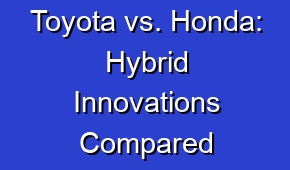Car Mileage

Car mileage refers to the number of miles a vehicle has traveled. It is an important factor in determining a car’s condition, resale value, and fuel efficiency. Higher mileage typically indicates more wear and tear on the car’s components. Regular maintenance can help extend the lifespan of a vehicle and improve its mileage.
When it comes to car mileage, fuel efficiency plays a crucial role in determining overall performance. Car mileage is a measure of how many miles a vehicle can travel on a gallon of fuel. Fuel efficiency is directly influenced by factors such as engine size, weight, and aerodynamics. To improve car mileage, drivers can adopt certain driving habits like maintaining a steady speed and avoiding sudden accelerations. Regular maintenance, such as keeping tires properly inflated and getting regular oil changes, can also contribute to better fuel efficiency. Furthermore, using high-quality fuel and considering fuel-saving technologies can help maximize car mileage and reduce overall fuel costs.
| Car Mileage |
| A measure of how far a car can travel on a certain amount of fuel. |
| Fuel efficiency affects car mileage, with higher efficiency resulting in more miles per gallon. |
| Factors that influence car mileage include driving habits, vehicle weight, and road conditions. |
| Regular maintenance, such as tire inflation and oil changes, can improve car mileage. |
| Hybrid and electric cars often have higher mileage ratings compared to traditional gasoline-powered cars. |
- Fuel economy is a key factor in determining a car’s mileage.
- Driving at a steady speed can help optimize car mileage.
- Using cruise control on highways can improve fuel efficiency and mileage.
- Reducing weight in the car, such as removing unnecessary items, can enhance mileage.
- Driving with properly inflated tires can contribute to better car fuel consumption and mileage.
What is car mileage and how is it calculated?
Car mileage refers to the distance a vehicle can travel on a specific amount of fuel. It is calculated by dividing the total distance traveled by the amount of fuel consumed. This calculation provides a measure of a car’s fuel efficiency and is usually expressed in miles per gallon (MPG) or kilometers per liter (KPL).
Calculating car mileage involves keeping track of the distance traveled and the amount of fuel consumed. To calculate mileage, divide the total distance traveled by the amount of fuel used during that period. This can be done manually or using the car’s onboard computer system, which provides real-time mileage information.
What factors affect car mileage?
Several factors can affect a car’s mileage, including driving habits, road conditions, vehicle weight, engine size, and maintenance. Aggressive driving, excessive idling, and speeding can significantly reduce fuel efficiency. Road conditions such as traffic congestion and hilly terrain can also impact mileage.
The weight of the vehicle and its cargo can affect mileage. Heavier cars require more energy to move, resulting in lower fuel efficiency. The size of the engine plays a role as well, as larger engines tend to consume more fuel. Regular maintenance, such as oil changes and proper tire inflation, can also improve mileage.
How can I improve my car’s mileage?
To improve car mileage, you can follow several tips. Maintaining a steady speed, avoiding rapid acceleration and braking, and reducing idling time can all help save fuel. Keeping tires properly inflated, using the recommended grade of motor oil, and removing excess weight from the vehicle can also improve mileage.
Regular vehicle maintenance, including air filter and spark plug replacements, can optimize engine performance and fuel efficiency. Using cruise control on highways and avoiding unnecessary trips can further enhance mileage. Additionally, choosing a fuel-efficient vehicle or considering alternative fuel options can have a significant impact on overall mileage.
What is the average car mileage for different types of vehicles?
The average car mileage can vary depending on the type of vehicle. Compact cars typically have higher mileage, ranging from 25 to 30 MPG, while larger sedans may have mileage around 20 MPG. SUVs and trucks generally have lower mileage, ranging from 15 to 20 MPG.
Hybrid and electric vehicles offer higher fuel efficiency, with some models achieving over 50 MPG or the equivalent in electric range. However, mileage can vary depending on driving conditions and individual driving habits. It is important to consider the specific make and model of a vehicle to determine its average mileage.
What are the benefits of high car mileage?
High car mileage, or good fuel efficiency, offers several benefits. It reduces the overall cost of fuel, saving money for the vehicle owner. It also helps reduce greenhouse gas emissions, contributing to a cleaner environment. Additionally, high car mileage allows for longer distances to be covered on a single tank of fuel, increasing convenience and reducing the need for frequent refueling.
Moreover, vehicles with high mileage often have a higher resale value, as fuel-efficient cars are in high demand. They may also qualify for certain tax incentives or rebates, depending on local regulations and government initiatives. Overall, high car mileage is advantageous both economically and environmentally.
What are the disadvantages of low car mileage?
Low car mileage, or poor fuel efficiency, can have several disadvantages. It results in higher fuel costs as more fuel is required to cover the same distance. This can put a strain on the vehicle owner’s budget, especially when fuel prices are high.
Low car mileage also contributes to increased greenhouse gas emissions, negatively impacting the environment. It may lead to more frequent refueling, causing inconvenience and wasting time. Additionally, vehicles with low mileage may have a lower resale value, as they are less fuel-efficient and may not meet the needs of potential buyers.
How does driving style affect car mileage?
Driving style plays a crucial role in determining car mileage. Aggressive driving habits, such as rapid acceleration, hard braking, and speeding, can significantly reduce fuel efficiency. These actions require more energy from the engine, leading to higher fuel consumption.
On the other hand, adopting a smooth and steady driving style can improve car mileage. Gradual acceleration, gentle braking, and maintaining a consistent speed help optimize fuel efficiency. By avoiding sudden changes in speed and allowing the vehicle to coast when possible, drivers can maximize mileage and save on fuel costs.
What impact does traffic congestion have on car mileage?
Traffic congestion can have a negative impact on car mileage. Stop-and-go traffic requires frequent acceleration and deceleration, which consumes more fuel compared to steady driving. The constant braking and idling in congested traffic result in lower fuel efficiency.
When stuck in traffic, it is important to maintain a safe distance from the vehicle ahead and anticipate traffic flow to minimize unnecessary braking. Carpooling, using public transportation, or planning routes to avoid congested areas can also help reduce the impact of traffic congestion on car mileage.
Does car mileage decrease over time?
Car mileage can decrease over time due to various factors. As a vehicle ages, its engine and mechanical components may experience wear and tear, leading to reduced fuel efficiency. Lack of proper maintenance and neglecting routine servicing can also contribute to a decline in mileage.
Additionally, changes in driving habits or conditions can affect car mileage. If a driver starts driving more aggressively or experiences more traffic congestion, the mileage may decrease. It is essential to maintain regular maintenance and address any mechanical issues promptly to preserve fuel efficiency.
How does vehicle weight affect car mileage?
Vehicle weight can have a significant impact on car mileage. Heavier vehicles require more power to accelerate and maintain speed, resulting in increased fuel consumption. Carrying excess weight, such as unnecessary cargo or roof racks, can also reduce mileage.
To optimize car mileage, it is advisable to remove any unnecessary weight from the vehicle. This includes removing roof racks when not in use and avoiding excessive cargo in the trunk. By reducing the weight of the vehicle, fuel efficiency can be improved.
What is the relationship between car mileage and engine size?
The relationship between car mileage and engine size is generally inversely proportional. Larger engines tend to consume more fuel compared to smaller engines, resulting in lower mileage. This is because larger engines require more energy to operate and power the vehicle.
However, advancements in technology have allowed manufacturers to develop more efficient engines, even in larger vehicles. Some larger vehicles now offer better mileage due to advanced fuel injection systems, turbocharging, and other efficiency-enhancing features. It is important to consider the specific make and model of a vehicle to determine the impact of engine size on mileage.
What is the difference between city and highway car mileage?
The difference between city and highway car mileage is primarily due to driving conditions. City driving involves frequent stops, traffic congestion, and lower average speeds, which can decrease mileage. On the other hand, highway driving offers steady speeds and fewer stops, resulting in better mileage.
During city driving, cars often have to accelerate and decelerate frequently, consuming more fuel. Idling in traffic and navigating through congested areas can further reduce fuel efficiency. Highway driving allows for more consistent speeds, reducing the energy required to maintain momentum and improving mileage.
How do weather conditions affect car mileage?
Weather conditions can impact car mileage, especially extreme temperatures. Cold weather can decrease fuel efficiency as the engine takes longer to warm up, and the use of heaters and defrosters increases energy consumption.
In hot weather, air conditioning can also put a strain on the engine, causing higher fuel consumption. Additionally, strong winds can create drag, requiring more power to maintain speed and reducing mileage. It is important to consider weather conditions when calculating expected mileage and adjust driving habits accordingly.
What is the relationship between car mileage and tire pressure?
The relationship between car mileage and tire pressure is significant. Underinflated tires create more rolling resistance, requiring the engine to work harder and consume more fuel. This decreases mileage and can also lead to uneven tire wear.
On the other hand, properly inflated tires reduce rolling resistance and allow the vehicle to move more efficiently. Regularly checking tire pressure and maintaining it at the recommended level can improve car mileage and extend the life of the tires.
How does maintenance affect car mileage?
Maintenance plays a vital role in preserving car mileage. Regular maintenance, such as oil changes, air filter replacements, and spark plug checks, ensures the engine operates optimally. A well-maintained engine consumes fuel more efficiently, resulting in better mileage.
Ignoring maintenance tasks can lead to decreased mileage as worn-out components and dirty filters can hinder performance. It is important to follow the manufacturer’s recommended maintenance schedule and address any issues promptly to maintain optimal fuel efficiency.
What are some common misconceptions about car mileage?
One common misconception is that a higher car mileage means poorer performance or higher maintenance costs. In reality, modern vehicles are designed to maintain performance and efficiency even at higher mileage.
Another misconception is that premium fuel improves mileage. Unless specified by the manufacturer, using premium fuel in a car designed for regular fuel does not provide any significant mileage benefits. It is important to follow the recommended fuel type for a vehicle to optimize mileage.
How do different fuel types affect car mileage?
Different fuel types can have varying effects on car mileage. Traditional gasoline provides a balance between performance and fuel efficiency. Diesel fuel generally offers higher mileage due to its higher energy content and better combustion efficiency.
Hybrid and electric vehicles provide excellent mileage, especially in urban driving conditions. They use a combination of electric motors and internal combustion engines or rely solely on electric power, resulting in lower fuel consumption. However, charging infrastructure and battery range can affect overall mileage in electric vehicles.
What are some fuel-saving technologies that can improve car mileage?
Several fuel-saving technologies can improve car mileage. Start-stop systems automatically turn off the engine when the car is stationary, reducing fuel consumption during idle periods. Hybrid powertrains combine electric motors with internal combustion engines, optimizing fuel efficiency.
Direct fuel injection, turbocharging, and variable valve timing are also technologies that enhance mileage by improving engine efficiency. Regenerative braking systems in hybrid and electric vehicles convert kinetic energy into electrical energy, reducing reliance on traditional braking and improving mileage.





















